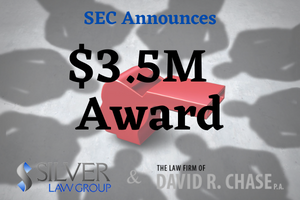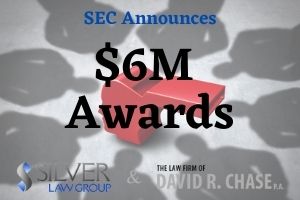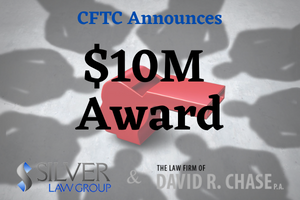 Of those who provide tips to the Securities and Exchange Commission (SEC) whistleblowing program, an estimated 20% are anonymous when they submit their information. And the SEC is required to keep whistleblowers’ information confidential. But what if you submitted the information anonymously, and your identity became known? Continue reading
Of those who provide tips to the Securities and Exchange Commission (SEC) whistleblowing program, an estimated 20% are anonymous when they submit their information. And the SEC is required to keep whistleblowers’ information confidential. But what if you submitted the information anonymously, and your identity became known? Continue reading
Does It Impact A Whistleblowing Complaint If You And A Colleague Come Forward Together?
 Perhaps one of the most difficult parts of becoming a whistleblower is feeling alone when you go against your company. But what if you and another colleague both decide to go to the Securities and Exchange Commission (SEC) and become joint whistleblowers? How does that change the equation?
Perhaps one of the most difficult parts of becoming a whistleblower is feeling alone when you go against your company. But what if you and another colleague both decide to go to the Securities and Exchange Commission (SEC) and become joint whistleblowers? How does that change the equation?
You and a colleague can become joint whistleblowers, and you can both receive an award. (For instance, in April 2021, the SEC announced that joint whistleblowers would share a $50 million award.) Continue reading
If You Were Complicit In Some Wrongdoing, Does That Impact Your Role As An SEC Whistleblower?
 One question many whistleblowers worry about: What if their whistleblowing uncovers their own participation in the wrongdoing? And if it does so, how might that impact their liability and eligibility for an award?
One question many whistleblowers worry about: What if their whistleblowing uncovers their own participation in the wrongdoing? And if it does so, how might that impact their liability and eligibility for an award?
Some culpability is not an automatic bar from a securities whistleblower award. Continue reading
If The Bad Actions Took Place Overseas, Does that Affect An SEC Whistleblowing Report?
![If you are considering filing a whistleblowing report with the United States Securities and Exchange Commission (SEC), you might wonder if the SEC program covers violations that take place abroad. The short answer is: Probably, but it depends. As a starting point, it’s worth noting that there is no requirement for whistleblowers to be US residents or citizens. On the contrary, since the beginning of the SEC’s program, eligible whistleblowers from 130 countries—including the United Kingdom, Canada, China, Australia, and India—have come forward with tips for the SEC to review. When it comes to what (and where) the SEC can investigate, Dodd-Frank Act gives the SEC authority over extraterritorial malfeasance under one of the following two conditions: 1) when the relevant securities transaction occurs outside of the US, the conduct within the US “constitutes significant steps in furtherance of the [securities] violation,” or 2) when the conduct outside of the US still “has a foreseeable substantial effect” within the US.](https://www.secwhistleblowerlawyers.net/wp-content/uploads/sites/270/2019/06/Whistleblower1-300x200.jpg) If you are considering filing a whistleblowing report with the United States Securities and Exchange Commission (SEC), you might wonder if the SEC program covers violations that take place abroad. The short answer is: Probably, but it depends.
If you are considering filing a whistleblowing report with the United States Securities and Exchange Commission (SEC), you might wonder if the SEC program covers violations that take place abroad. The short answer is: Probably, but it depends.
As a starting point, it’s worth noting that there is no requirement for whistleblowers to be US residents or citizens. On the contrary, since the beginning of the SEC’s program, eligible whistleblowers from 130 countries—including the United Kingdom, Canada, China, Australia, and India—have come forward with tips for the SEC to review. Continue reading
Not All Frauds Are Ponzi Schemes: Sometimes They’re Just Stealing The Money
 If you hear the phrase “Ponzi scheme,” you may immediately think of Bernie Madoff’s $68 billion 20-year long fraud exposed in 2008. But there have been many high-profile Ponzi schemes since. Just in February 2022, film actor Zachary Horwitz was sentenced to 20 years in prison for his Hollywood-based Ponzi Scheme—a $650 million fraud. Then, later that month, the founder of cryptocurrency BitConnect was indicted for his role in a $2 billion Ponzi scheme. And just a couple of weeks later, a Utah business owner received a 19-year prison sentence for his Ponzi Scheme that defrauded 568 victims of $200 million. Continue reading
If you hear the phrase “Ponzi scheme,” you may immediately think of Bernie Madoff’s $68 billion 20-year long fraud exposed in 2008. But there have been many high-profile Ponzi schemes since. Just in February 2022, film actor Zachary Horwitz was sentenced to 20 years in prison for his Hollywood-based Ponzi Scheme—a $650 million fraud. Then, later that month, the founder of cryptocurrency BitConnect was indicted for his role in a $2 billion Ponzi scheme. And just a couple of weeks later, a Utah business owner received a 19-year prison sentence for his Ponzi Scheme that defrauded 568 victims of $200 million. Continue reading
What Is “Securities Fraud”?
 People toss around the term “fraud” all the time, often it to describe something fake or insincere. But when it comes to the legal understanding of the term in context of the securities laws, fraud means more than something fake. Understanding what fraud means is important for those who work in the financial sphere—especially if you’re working with clients who aren’t sophisticated investors. Where the line is between aggressive sales, marketing and investing, and actual fraud is sometimes hard to determine. Continue reading
People toss around the term “fraud” all the time, often it to describe something fake or insincere. But when it comes to the legal understanding of the term in context of the securities laws, fraud means more than something fake. Understanding what fraud means is important for those who work in the financial sphere—especially if you’re working with clients who aren’t sophisticated investors. Where the line is between aggressive sales, marketing and investing, and actual fraud is sometimes hard to determine. Continue reading
How Do You Report a Fraudulent SPAC to the SEC Whistleblower Office?
 If you’re aware of a SPAC that is defrauding investors, you may be wondering if you should go to the Securities and Exchange Commission (SEC) and become a whistleblower. While how to best submit your case will always depend on your case, here are guidelines to help you understand the process. But one thing to keep in mind from the start: It’s important to realize that the SEC receives many tips, but it only pursues a few. So the real issue isn’t how you file a tip. Your real question should be, “How do you get the SEC to take an interest in your case?” Continue reading
If you’re aware of a SPAC that is defrauding investors, you may be wondering if you should go to the Securities and Exchange Commission (SEC) and become a whistleblower. While how to best submit your case will always depend on your case, here are guidelines to help you understand the process. But one thing to keep in mind from the start: It’s important to realize that the SEC receives many tips, but it only pursues a few. So the real issue isn’t how you file a tip. Your real question should be, “How do you get the SEC to take an interest in your case?” Continue reading
SEC Awards Four Whistleblowers A $3.5M Bounty
 The SEC announced another whistleblower bounty that paid nearly $3.5 million to four individuals.
The SEC announced another whistleblower bounty that paid nearly $3.5 million to four individuals.
Jointly, three whistleblowers provided information to the SEC that led to the staff opening an investigation. The investigation led to a successful enforcement action by the SEC. Additionally, that information and investigation led to another agency opening its own investigation, culminating in a separate enforcement action. Continue reading
SEC Awards $6 Million To Five Joint Claimants
 The SEC has announced its latest whistleblower bounty of $6 million to five individuals in two groups for one single covered action.
The SEC has announced its latest whistleblower bounty of $6 million to five individuals in two groups for one single covered action.
The first group, known as “Claimant 1” in the order, provided crucial documents to the SEC that led to requests for additional documentation. These documents were the crux of the SEC’s case. The individuals continued to provide documentation and information to help SEC staff to understand the company’s business practices. Continue reading
CFTC Whistleblower Award – April 2022
 The Commodities Futures Trading Commission (CFTC) recently awarded a bounty of $10 million to a whistleblower who offered original information voluntarily. The information led to the opening of an investigation and a subsequent successful enforcement action.
The Commodities Futures Trading Commission (CFTC) recently awarded a bounty of $10 million to a whistleblower who offered original information voluntarily. The information led to the opening of an investigation and a subsequent successful enforcement action.
According to the order, the individual provided the information properly via a Form TCR that involved information previously unknown to the CFTC, and in violation of the Commodity Exchange Act (CEA.) The whistleblower was under no obligation to provide this information, and provided it at the outset of the investigation, when the CFTC was unaware of the ongoing conduct. Continue reading
 SEC Whistleblower Lawyer Blog
SEC Whistleblower Lawyer Blog

